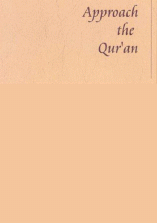Approach the Quran

Receiving Payment for Teaching the Qur'an
Muslim scholars hold different opinions regarding the permissibility of receiving payment for teaching the Glorious Qur'an. A group of scholars are of the opinion that it is permissible to receive payment for teaching the Glorious Qur'an. The proponents of this view quote the following narration of ibn`Abbas (may Allah be pleased with them both) in support of their opinion,
"You are most entitled to take wages for (performing a Ruqya[1] with Allah's Book. [2]
lt is said that one can receive payment for teaching the Quran in case it is not his duty to do so. This opinion has been maintained by Al-Halimi.
In his Al-Bustan (the Garden), Abu Al-Layth stated that teaching is of three kinds: (l) teaching in anticipation of Allah's reward without receiving payment, (2) teaching in lieu of a certain payment, and (3) teaching without any condition in which case if the teacher is offered any gift he can accept it.
The first will be rewarded by Allah, for it is the mission of the Prophets. As to the second kind, there are different opinions. Early scholars, on the one hand, were of the opinion that it is not Permissible to receive payment for teaching, since the Prophet (peace be upon him) said,
"Inform about me even (fit is only one verse. "[3]
A group of late scholars, on the other hand. have stated that it is permissible. They have added that it is preferable not to fix a certain payment for teaching the Quran or writing. However, in the case of fixing a certain payment for teaching the Qur'an, I prefer the opinion that there will be no wrong done because Muslims are in need of doing so.
Regarding the third kind, scholars unanimously agree that it is permissible because the Prophet (peace be upon him) was a teacher for all people and he used to accept gifts. In this context, we may recall the incident when some Companions of the Prophet went on a journey until they reached a tribe whose people refused to treat them as their guests. The chief of that tribe was then bitten by a snake and they tried their best to cure him but in vain. They asked those Companions if they had anything useful. One of the Companions accepted to recite a Ruqyah for the patient on condition that they fix some wages for it. They agreed to pay them a flock of sheep. After reciting surat Al-Fatihah as a Ruqynh for the patient, he became well. They paid them what they had agreed to pay. The Companions went to Allah's Messenger (peace be upon him) and narrated the
story. Allah's Messenger said, "You have done the right thing. Divide (what you have earned) and assign a share for me as well." The Prophet smiled thereupon. [4]
Moreover, the Prophet (peace be upon him) made teaching the Quran a dowry for a woman, as Sahl ibn Sa`d narrated that a lady came to the Prophet (peace be upon him) and declared that she had decided to offer herself to Allah and His Messenger. The Prophet Said. "I am not in need of women." A man said (to the Prophet), "Please marry her to me." The Prophet said (to him),
"Give her a garment." The man said, "I cannot afford it." The Prophet said, "Give her anything, even if it be an iron ring." The man apologized again. The Prophet then asked him, "What have You memorized of the Qur'an?" He replied, "I memorize such-and-such portion of the Qur'an." The Prophet said, "Then I marry her to you for that much of the Qur'an which you learn by heart."[5]
We should keep in mind, however, that what is mentioned above is pertinent to receiving payment for teaching the Glorious Qur'an which is not permissible for reciting it. Reciting The Glorious Qur'an is an act of worship that the worshiper cannot receive payment for. Worship should be dedicated to Allah alone, the Only One Who rewards for it. In this connection, `Abdur-Rahman ibn Shibl reported that the Prophet (peace be upon him) said,
"Recite the Quran; act according to it; do not abandon it; do not be excessive regarding it; do not earn livelihood by means of it; and do not seek increase (in wealth) through it. "[6]
`Umran ibn Husayn (may Allah be pleased with him) reported that the Messenger of Allah (peace be upon him) said,
"Recite the Qur'an and ask (the favor of) Allah by it before the coming of some people who recite the Qur'an to ask ( the favor of) people by it. "[7]
Nevertheless, if the person who recites the Qur'an is given something as a gift or alms, he is permitted to accept it.
[1] Ruqyah: (pl. ruqa); It means the recitation of some Qur'anic verses as a treatment for
a disease. (Trans.)
[2] Reported by Al-Bukhari.
[3] Reported by Al-Bukhari.
[4] Reported by Ibn `Abbas.
[5] Agreed upon hadith,
[6] Reported by Ahmad. At-Tabarani. and Al-Bayhaqi.
[7] Reported by Ahmad. At-Tabarani, and Al-Bayhaqi.
